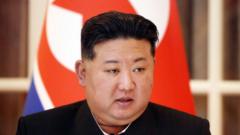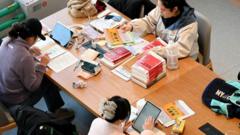Through a blend of journalism and fictional writing, Han Song captures the surreal and often bleak transformation of modern China. His imaginative narratives challenge perceptions of the future, frequently clashing with reality in unexpected ways.
Imagining the Future: A Chinese Sci-Fi Author's Uneasy Dance with Reality

Imagining the Future: A Chinese Sci-Fi Author's Uneasy Dance with Reality
Han Song's provocative storytelling navigates the complexities of China's rapid modernization, often eerily foretelling events that later transpire.
In the realm of science fiction, envisioning the future is an essential component, but Han Song, a prominent Chinese author of the genre, often appears to be chronicling the present instead. His prophetic writing has, at times, mirrored recent historical events with disconcerting accuracy.
Back in 2000, Han penned a novel forecasting the tragic collapse of the World Trade Center, and by 2016, he created a dystopian vision of a world enveloped in a massive hospital, where citizens were forcibly taken from their homes — a metamorphosis echoed during the Covid-19 pandemic.
Reflecting on his work, the 59-year-old writer states, “I believed I was merely crafting fiction, oblivious to the possibility that reality could surpass my imagination." He references his unsettling book "Hospital,” wherein societal circumstances reduced everyone to mere patients: “What once seemed unthinkable unfolded just a few years later,” he remarked, illustrating how authenticity can often seem more bizarre than fiction itself.
For over four decades, Han has delved into this paradox, balancing his day job as a journalist with China’s state news agency, where he records the nation's remarkable advancements, against his nighttime endeavors of fiction writing — each serving as a canvas to explore the disorienting effects of rapid modernization on society.
His narratives are frequently dark and surreal, probing the cultural chasm between China and the West. In "The Passengers and the Creator," he portrays a reality where Chinese citizens fervently idolize an enigmatic deity named Boeing. In another vision, he illustrates a future where China emerges as the dominant global superpower. Many of his narrative landscapes, set against ordinary backdrops like subway systems, spiral into the grotesque with haunting imagery of cannibalism and excess, forcing readers to confront harrowing possibilities.
As Han continues to engage with the unpredictable nature of reality through his compelling stories, his writings stand as a haunting reminder of the fine line between fiction and reality in a rapidly changing world.



















